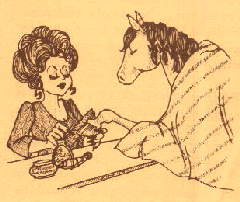|
|
|
KEEPING YOUR WILD HORSE OR BURRO HEALTHY
|
Information and graphics courtesy of BLM,
from their Getting
Acquainted pamphlet,
which is available at your area BLM Field
Office.
 Although your wild horse or burro may be malnourished, we attempt to ensure
the basic good health of all animals placed in adoption You should have been
provided a health care record for your animal listing the treatments, blood
tests, and vaccinations he received. Requirements necessary to keep him
healthy and improve his condition are similar to those of a domestic animal
with a few variations. Your local veterinarian specialIzIng in the care and
treatment of large animals will help you develop a health program based on
preventive medicine for your horse or burro.
Although your wild horse or burro may be malnourished, we attempt to ensure
the basic good health of all animals placed in adoption You should have been
provided a health care record for your animal listing the treatments, blood
tests, and vaccinations he received. Requirements necessary to keep him
healthy and improve his condition are similar to those of a domestic animal
with a few variations. Your local veterinarian specialIzIng in the care and
treatment of large animals will help you develop a health program based on
preventive medicine for your horse or burro.
The vaccinations your horse or burro received at the BLM adoption center
will not provide full immunity unless boosters are administered within
approximately 4 weeks. Your animal may not need all of the vaccinations
previously given - your veterinarian win be able to tell you which are
necessary for your animal. He will also advise you on a regular schedule for
future vaccinations.
Parasite control is vital for your horse or burro's health and well being.
Although he was wormed by BLM before adoption, additional treatment should be
administered about 4 weeks after adoption, and on a iegul& schedule every 3
months or so. Again, your veterinarian can advise you on proper methods and
schedules. Feed-additive wormers can be used until your animal is suffidently
gentled for tube or paste worming.
Most wild horses and burros will have good feet at the time of adoption.
However, in captivity the hooves will not wear as they did naturally and may
also crack Therefore, It will be necessary periodically to have the animal's
feet trimmed, beginning about 8 weeks after adoption (or as soon thereafter as
he can be handled). The frequency of hoof trimming and/or shoeing will depend
upon the amount of hoof wear and the soil conditions of the corral. A
reputable farrier should be consulted concerning hoof care and a regular
program of hoof maintenance.
Your wild horse or burro's teeth also will need adequate care. His teeth
grow continuously throughout his life and are worn downas he eats. If they
wear unevenly, sharp edges or points develop that cause him pain and prevent
him from adequately chewing his food. Your veterinarian can file off these
uneven spots (a procedure called floating) as necessary. Your animal's teeth
should be checked on a yearly basis. Because of his diet in the wild, your
adopted wild horse or burro may show accelerated tooth wear compared to a
domestic animal of his age.
This is not a BLM operated or BLM sponsored site. It
is run by private wild horse and burro enthusiasts. We are thankful to the
BLM for providing the information which is presented here.

|